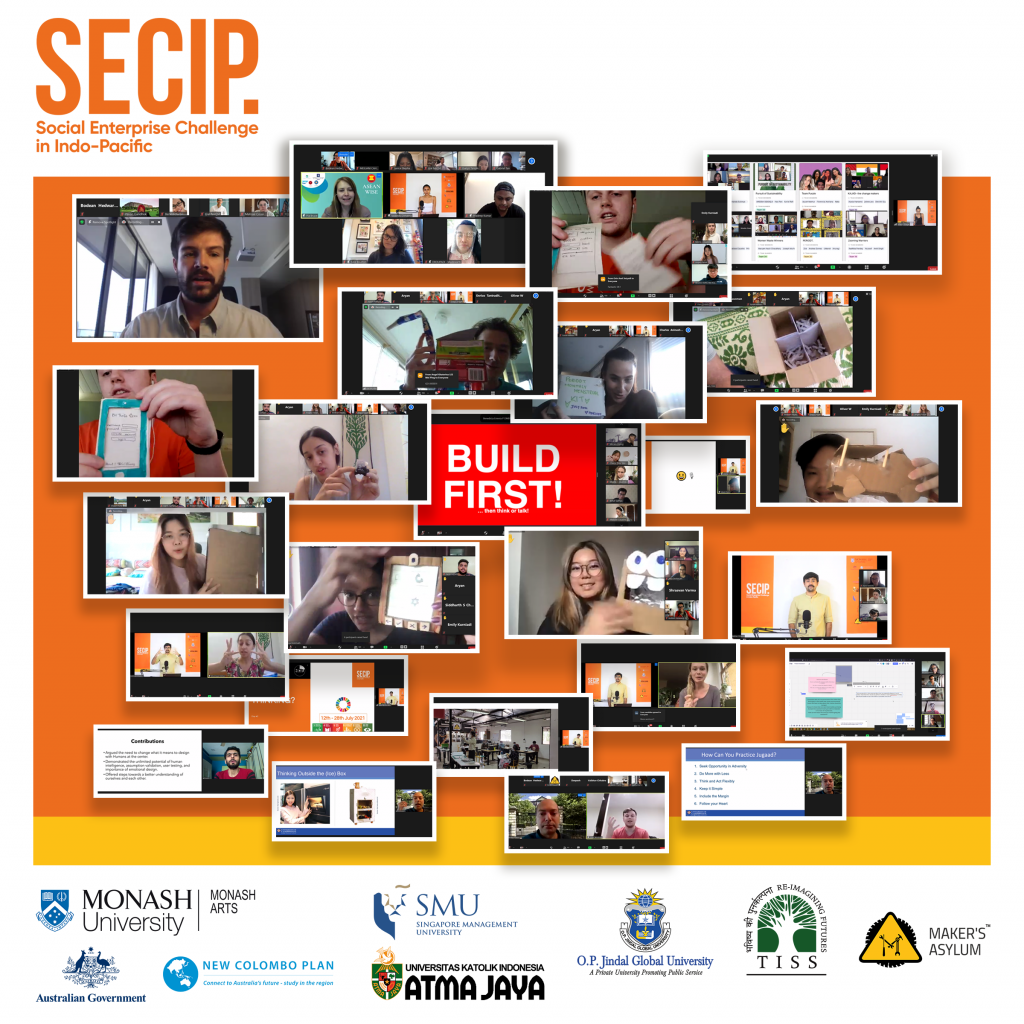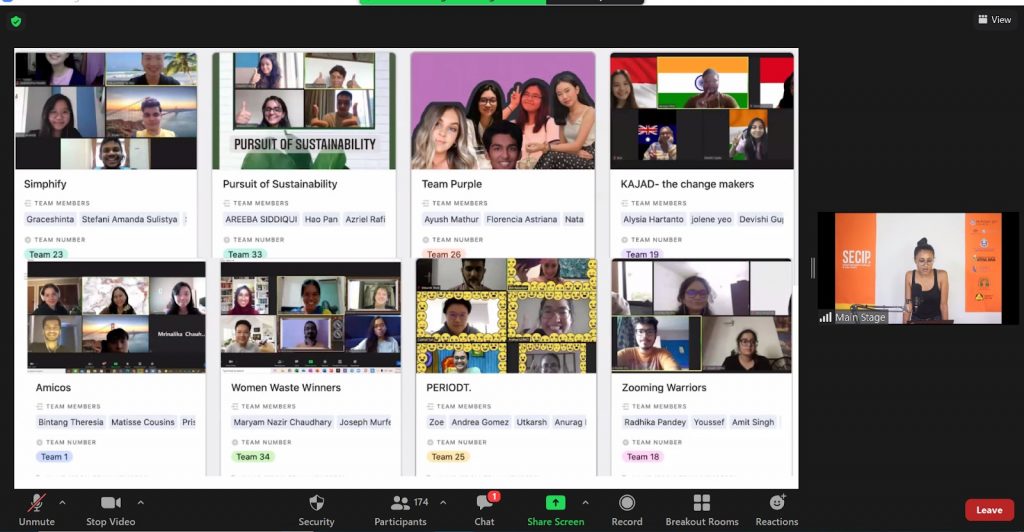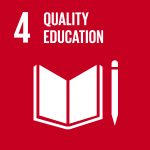Esta web utiliza cookies para que podamos ofrecerte la mejor experiencia de usuario posible. La información de las cookies se almacena en tu navegador y realiza funciones tales como reconocerte cuando vuelves a nuestra web o ayudar a nuestro equipo a comprender qué secciones de la web encuentras más interesantes y útiles.
Social Enterprise Challenge
in the Asia Pacific:
A Virtual Incubator
Description
Institution
Monash University

Organizations/areas of the university involved
Makers Asylum, India
OP Jindal Global University, India
Atma Jaya Catholic University of Indonesia, Indonesia
Country
Australia
The Social Enterprise Challenge in the Asia-Pacific (SECAP) Program is a two-week virtual, experiential initiative that gives students hands-on experience in establishing a social enterprise that can have immediate impact.
The SECAP program aims to shift the dial on the way that young people collaborate, share and build solutions. It works to promote entrepreneurial thinking among graduates and provides a platform for interdisciplinary, intercultural understanding and collaboration. Co-designed and delivered with industry partner Makers Asylum and leading university partners, OP Jindal Global University in Delhi and Atma Jaya Catholic University of Indonesia in Jakarta, the SECIP program is a platform for cross-cultural, interdisciplinary teams of students to engage in an intensive start-up incubator. Based on the principles of design and systems thinking, frugal innovation and rapid prototyping, the program focuses on creating tangible solutions related to the UN Sustainable Development Goals (UN SDGs).
Launched in January 2021 to meet the demand for ongoing international engagement among students, the SECAP program facilitates access to a global network of leading industry mentors and experts that can support students in mobilizing their ideas, and continue to engage around our region. Involving students from diverse social, cultural and disciplinary backgrounds, the SECAP program pushes students to look at how they can use their combined resources, networks and skills to establish grass-roots solutions to address regional and global challenges. Delivered entirely online, the SECAP program prepares students for a rapidly changing contemporary work place. As a credit-bearing program, students develop the skills to effectively operate in virtual teams made up of colleagues and partners based around our region while working toward the completion of their degree. Every day for two-weeks, student teams meet to understand the context surrounding local challenges as they relate to the UN SDGs, test their assumptions, develop an idea, make, break and re-create prototypes, and then pitch their ideas to a panel of Government, non-government and private sector experts already leading responses to these challenges.
Following the success of the first program, we are working to increase the scale and diversity of students through a model of participation that ensures that all students, regardless of their financial means or degree, can participate in this transformative international experience.
Results and impact measured or expected
SECAP aims to mobilize a generation of innovative, globally focused, culturally aware students that can work across sectors to shape our world in the future. We are already seeing positive changes; student evaluations reported improvements in knowledge, understanding and confidence in responding to global challenges. “[SECIP] showed us how to use the skills and resources that we have to build something meaningful, which made the overwhelming challenge of problem solving a lot more accessible.” Student participant, January 2021 Around 100 students from our partner universities in India, Indonesia and Australia participated in the first program, with students from Singapore and Malaysia joining in the next iterations. This geographical diversity is complemented by the inherent interdisciplinarity; students have backgrounds in business, science, economics, and the humanities among others. Finally, despite entrepreneurial studies having typically low participation among women, approximately 70 per cent of participants were young women.
Connection with the SDG framework
The SECAP program is designed to improve access to transformational international education opportunities across the Indo-Pacific (SDG 4.3), and ensure that all students have the knowledge, skills and networks needed to promote sustainable development (SDG 4.7). Students work together to understand the role of social entrepreneurship, innovation and design and apply these to real-world examples. Working to identify local solutions to challenges directly linked to the SDG objectives, students develop the knowledge and understanding of the SDG framework, its purposes and how to apply it. Importantly, the program is available to all students, ensuring that key competencies to implement such solutions, such as systems and critical thinking, problem solving, creativity, curiosity and the ability to work in cross-culture, interdisciplinary settings.
Barriers and follow up
The SECAP program is co-designed and co-delivered, with the aim of being a credit-bearing program that can be integrated into as many degrees as possible. This requires each participating university to adopt the curriculum and pedagogical approach into their own systems and degree structures, and commit the resources to manage student enrollments, support them throughout the unit and grade assessments. They key challenge is inherent in the different university structures and processes involved in developing new curricular initiatives and ensuring consistency and fairness in grading models. The solution to each challenge is grounded in the co-design model adopted for the program. The three original university partners were deeply involved in the curation of learning materials, design of the intensive incubator experience and the assessment requirements. This approach provided the flexibility required for each partner to integrate into their systems and degree structures.
Transferability of the initiative
The SECAP program is designed to mobilise a generation of young people across the region to be able to respond to our most pressing challenges. It is therefore inherently scalable and inclusive, with a vision of having students from all countries in the region participating in the future. We have developed several models for participating and existing partners work with interested universities to establish a model that meets their requirements and circumstances. Importantly, the focus on the Indo-Pacific does not exclude participation from universities in other regions; regardless of geographic location, young people globally will need the skills, knowledge and networks to effectively develop solutions to sustainable development challenges. Further, regardless where students are from, the Indo-Pacific is home to several emerging world powers, and understanding the geopolitical, social and cultural context will be vital in their ability to effectively collaborate and develop solutions to local, regional and global challenges.
Education 4 SDG funciona gracias a WordPress


